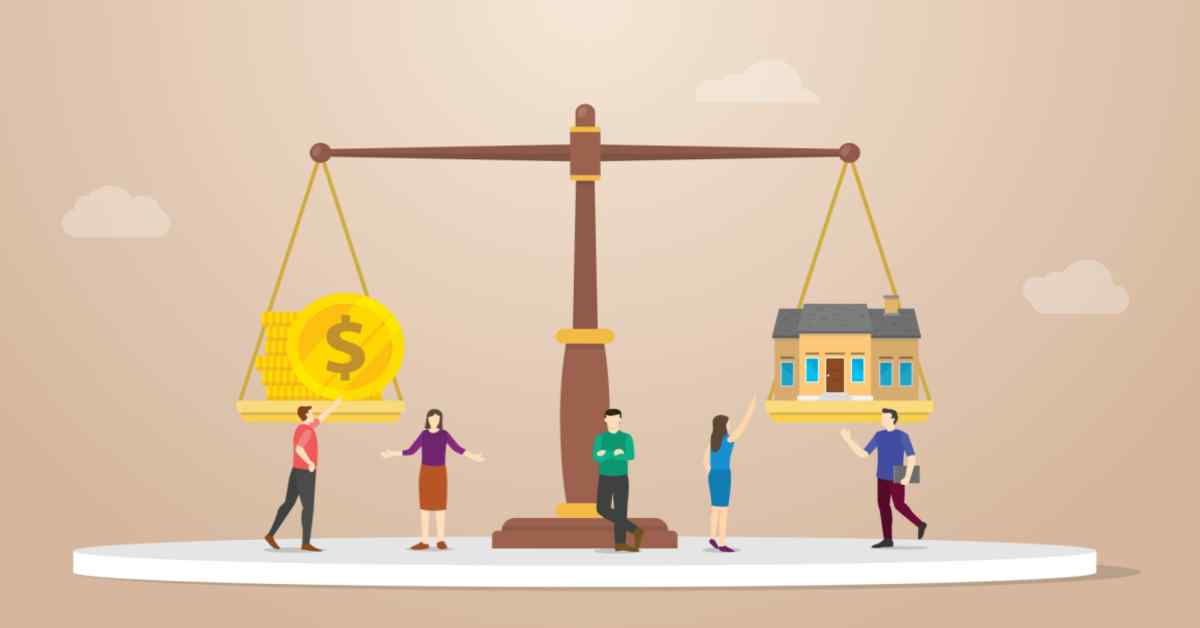Table of Contents
Quality Service Guarantee Or Painting Free

Get a rental agreement with doorstep delivery

Find the BEST deals and get unbelievable DISCOUNTS directly from builders!

5-Star rated painters, premium paints and services at the BEST PRICES!
Loved what you read? Share it with others!


Submit the Form to Unlock the Best Deals Today
Check Your Eligibility Instantly

Experience The NoBrokerHood Difference!
Set up a demo for the entire community

Tenant Super Relax Plan
Enjoy Hassle-Free Renting
 Full RM + FRM support
Full RM + FRM support Instant alerts & premium filters
Instant alerts & premium filters Rent negotiation & relocation help
Rent negotiation & relocation helpSavings VS Investment in Real Estate: Which is Better for Generating Wealth?
Table of Contents
Saving vs Investing — An Overview
Even though "saving" and "investing" are often used interchangeably, we should do both to make sure we have money in the future. The crucial role they have in our lives is a trait that both investing and saving share.
If you aren't already, start now. This may require you to change your budget, your spending habits, and how you spend your money, but it can and should be part of your plan. Savings decisions should generally be short-term, whereas investment decisions should be long-term.
Let's examine the differences between saving and investing while keeping that in mind. Additionally, keep in mind that when risk decreases, liquidity increases, and vice versa, both for saving and investing.
Quality Service Guarantee Or Painting Free

Get a rental agreement with doorstep delivery

Find the BEST deals and get unbelievable DISCOUNTS directly from builders!

5-Star rated painters, premium paints and services at the BEST PRICES!
What is meant by Savings?

Typically, the phrase "saving money" refers to a straightforward method of accumulating wealth, such as putting money in a bank account, making a fixed-term investment, or even putting it under your mattress. Saving money typically means having it on hand when we need it and having little chance of its value depreciating.
What is meant by Investments?

Investments generally refer to buying assets with the expectation that they will increase in value over time, such as gold, stocks, real estate, and other items, It's crucial to make investments wisely when you do so. If you start investing early, your return will be higher. Success depends on knowing the various investment options, what they are for, and how to use them. We invest for long-term objectives like retirement or our kids' college funds.
4 Advantages of Saving Your Money

When compared to investments, the following are some general benefits of saving money: When compared to investments, the following are some general benefits of saving money:
1. Return and Risk
The biggest distinction between investing and saving is probably this one. Market risks are present for investments. So, investments are usually riskier and more volatile, especially in the short term, but they can also make a lot of money in the long run. On the other hand, the returns on savings instruments are typically lower but guaranteed or predictable, making them safer than investments.
2. Purpose
Investments are typically made with long-term objectives in mind, such as retirement, home ownership, or paying for your child's education. Savings can help you achieve these goals. But because they don't bring in much money, it would take a lot longer to save up the money needed to reach these goals. So, you should use your savings for less urgent financial needs, like your daily and monthly bills. Making sure you are able to plan ahead for financial emergencies is another secondary goal of saving.
3. Inflation-Prevention Measures
Most savings instruments have lower returns than other types of investments, so they don't offer much protection against inflation. On the other hand, investments offer much higher returns and can help you deal with inflation, especially over the long term.
4. Fluidity
Liquidity levels are lower in investments like gold and real estate. If you sell other investments, like mutual funds, before they reach their maturity date, you may have to pay penalties. On the other hand, savings are typically very liquid assets. They are therefore better suited for pressing financial needs and short-term financial goals.
What are the Advantages of Investing Your Money?

The importance of savings and investments is listed below:
Investments Offer Higher Returns
Savings accounts and Certificates of Deposit (CDs) typically offer lower returns than investing products like stocks. Historically, the Standard & Poor's 500 stock index (S&P 500) has returned about 10% per year, but the return can vary by a lot from one year to the next. In terms of dollars, the Indian market likely generates annualized returns of 5 to 6 percent for the entire market, but the returns for good companies would undoubtedly be much higher.
Investments Offer High Liquidity
Products for investing are typically very liquid. On almost any weekday, it is simple to convert stocks, bonds, and Exchange-traded funds (ETFs) into cash.
Beating Inflation
If you have a portfolio of stocks with a lot of different types, you can easily beat inflation over time and increase your purchasing power. If inflation goes up faster than the interest on a savings or checking account, the investor will lose money. If your return is less than the rate of inflation, your ability to buy things will slowly go down. For example, India's retail inflation, as measured by the Consumer Price Index (CPI), fell to its lowest level in three months in October 2022, at 6.77 per cent. The CPI was 7.41% in September and 7% in August 2022. If your rate of return was less than that, you have accrued losses.
Why Real Estate Investing Outshines Bank Savings

The advantages of investing in real estate outweigh those of bank savings for the reasons stated below:
1. Currency Value Declines
Currency frequently loses value while real estate increases. The purchasing power of money keeps rising. However, tangible property is always valued. When you buy a piece of land in a good location today, take possession of it, and do all the necessary paperwork, you can get back 10 times or more of your investment when you sell it after five years.
2. Investments in Real Estate Are Vast
The return on investments in real estate is huge, but the return on cash reserves is almost nothing. Your investment return is typically in the single digits when you deposit money in a fixed account or save money at the bank. In contrast, the return on investment is almost always substantial, depending on the rate of growth in the neighbourhood where you buy your house or land.
3. Real Estate Increases Your Wealth.
Your bank account funds merely increase the banker's wealth, while your real estate funds increase your wealth. If you put money in a bank, it will use that capital to make loan payments, and you will be charged interest. The bank is required to deduct the difference between the money paid to you and the interest paid by the customer who lent you the money which helps enhance the banker's wealth. In contrast, when you purchase real estate, you fully retain the difference between the value at which the property was purchased and the price at which it is being sold. making you richer, then.
4. Savings can be Depleted by Expenses
Even if you often spend money to lower your income, the value of your property is still calculated. Even if you have money in the bank, you will still have to pay for things, which will use up your savings. Your money is tied to an investment that will increase in value if you put these funds into real estate.
5. Investment as a Career
Unlike what most people think, you don't need a lot of money saved up to invest in real estate. Numerous developments exist all over India that provide low sales prices, mortgage options, and other chances to buy without investing 100% of one's own money. The market for real estate investments has many entry points. Instead of just receiving interest from your investment, if you are experienced in real estate investing and have the extra money to buy, you could make significant capital gains or rent. You can team up with other investors, research purchasing with a property fund, or purchase shares in a Real Estate Investment Trust (REIT) if you don't have the money to start investing in real estate yourself. If you're willing to put in enough time, investing in real estate can be a career as well as a way to save money.
6. The Lifestyle Of Rich People
No rich person got rich because they were good at saving money, but most of them have impressive property portfolios with occupancy rates of over 90%. No rich person got rich because they were good at saving money, but most of them have impressive property portfolios with occupancy rates of over 90%. You can dedicate a land or house real estate program to a direct payment, lease, or mortgage payment, to be sure.
The Relationship between Saving and Investment from an Economical Perspective

Saving equals investment is a fundamental principle of macroeconomic accounting. Savings are defined as income-less expenses. Investments must be made in physical assets, not in money.
Saving equals investment is a logical conclusion of saving and investment because national income equals national product.
Savings = National Income – Consumption.
Effective Saving Strategies

It appears very simple, however, saving money is easier said than done. Due to rising costs and inflation, putting money away every month may seem like a hard task. However, it is crucial that you establish a routine of saving money, regardless of whether that means doing so incrementally.
This is so that over time, small sums that are periodically saved can add up to a sizable sum of money.
Your initial savings objective ought to be building an emergency fund. A year's or six months' worth of income is represented by this corpus of money. It will serve as your safety net in the event that you lose your job or become dependent on others as a result of an illness or accident. Next, you can begin setting aside money for immediate needs, such as a new phone or an annual vacation.
Recurring deposits are indeed a fantastic way to achieve these objectives. They act as a form of compelled saving, assisting you in setting aside money each month. You really have nothing to worry about there because saving instruments are typically very safe. Better returns are what you should search for! Choose your savings instruments carefully, opting for higher returns to maximize your income.
A Smart Investment Strategy: Here’s How You Can Start

Do some research on the different investment options and choose the ones that best meet your needs. When you finally locate the ideal investment tools, keep in mind to begin modestly and expand over time. Always bear in mind that various investments have different risk and return profiles. Depending on how much risk you're willing to take, how much time you have, and how much money you have, it's important to spread your investments out. Avoid putting all of the eggs inside one basket.
Another thing to keep in mind is that investments can be of a volatile nature, particularly over short time periods. To avoid losing money with any of your investments, it's crucial to hold onto them for at least three to five years. As a result, you must only invest money that you won't need during that time period; otherwise, you risk having to withdraw your money early in the event of a financial crunch.
Finally, before investing, always remember to read the terms and conditions. Before investing any of your money, make sure to be aware of all the costs and fees involved. The last thing you want to happen is for you to be caught off guard by some unanticipated expenses that lower the valuation of your investment or lower your returns.
How to Save and Invest in Real Estate with NoBroker?
Saving vs investing. There are lots of people who run into this problem. So don't worry if you're thinking along similar lines; you're not alone. Just keep in mind that both are necessary for your financial security.
Therefore, it is wise for you to start doing both of them right away if you have not started with at least one already.
Here’s where NoBroker’s financial and legal experts can be of help—Our top-rated experts can help you understand your risks and assets. You can achieve all your financial goals without any hassle. Just comment about your requirement and our expert professionals will get in touch with you shortly.

FAQs
There is no such thing as a bad time to start saving for retirement.
Your retirement funds will have more time and opportunity to increase the more you invest as well as the sooner you start. If you start investing early and keep at it, you might be able to make money from compounding.
Saving money is crucial in the first place because it can shield you in case of a financial crisis. Saving money can also help you pay for major purchases, stay out of debt, lessen your financial burdens, leave an economic legacy, and feel more financially independent.
Investing is a successful way to use your money and possibly increase your wealth. Your money may grow in value and outpace inflation if you make wise investment decisions. Compounding's effectiveness and the risk-return trade-off are the main causes of investing's higher growth potential.
If you want to increase the value of your savings, you must invest them such that the interest or financial gains they generate exceeds the rate of inflation. Therefore, all it takes to become wealthy is to consistently make investments that outpace inflation over time in accordance with your economic decisions!
Passive income, consistent cash stream, tax savings, diversification, and leverage are all advantages of real estate investing. In order to invest in real estate, one can use real estate investment trusts (REITs), which eliminate the need for the investor to own, manage, or finance any real estate.
Loved what you read? Share it with others!
Most Viewed Articles

Update Your Aadhaar Card Address: Quick and Convenient
January 31, 2025
27112+ views

HDFC Bank Holidays: State-Wise List of Holidays for HDFC Bank in 2025
January 25, 2025
26521+ views

What Is a Good Cibil Score? Learn Seven Ways to Improve Credit Score
January 31, 2025
23531+ views

State Bank of India Bank Holidays List 2025: State-Specific and Nationwide Dates for 2025
January 2, 2025
22079+ views

PNB Bank Holidays List: State-Wise Bank Holidays Lists in 2025
January 9, 2025
18970+ views
Recent blogs in
DTAA Income Tax India: Meaning, Importance, Benefits & Claim Tax Relief in 2025
July 4, 2025 by CA Akshay Attal
UCO Bank Holidays: List of State-Wise Bank Holidays in UCO Bank in 2025
April 1, 2025 by Priyanka Saha
Bandhan Bank Holidays: List of State-Wise Bank Holidays in Bandhan Bank in 2025
April 1, 2025 by Krishnanunni H M
Tax Deduction Under Section 80g of the Income Tax Act
January 31, 2025 by Kruthi




Join the conversation!